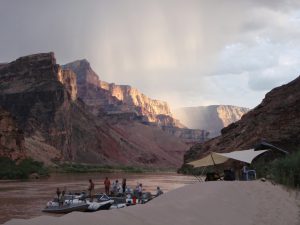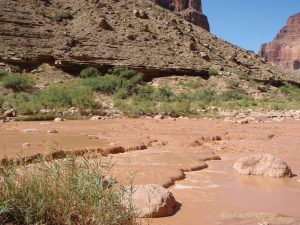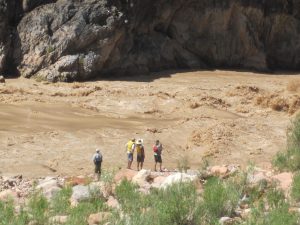Dr. Bill Pine is a professor at WEC and has a joint appointment with UF’s Fisheries and Aquatic Sciences program. Most of his work concerns assessing how large river and coastal ecosystems respond to changes in freshwater flow availability and quantitative population modeling to inform management decisions about endangered species.
Work
When did you know you wanted to work in ecology? Is there an origin story?
My origin story goes way back. When I was really young, my family built a small fishing pond on the little hobby farm they had, and I was really interested in the whole process. I’ve always enjoyed camping and being outdoors and had lots of opportunities to explore different places growing up. When I was in high school I met the regional fisheries biologists for our area through a high school class, and as part of this class we would meet the biologists to see what types of research and monitoring they were doing. I thought that was super interesting.
When I was fifteen, before I had my driver’s license, I had my Dad drive me to Auburn University to meet some of the fisheries faculty. We talked about their degree programs and career opportunities in fisheries and I’m still in touch with some of the people they introduced me to today, which is kind of and interesting part of it.
I started volunteering in a fisheries lab at Auburn the first quarter of my freshman year, so I’ve actually been working in an academic setting doing doing this type of work, in my life, for longer than I didn’t do this type of work.
That’s crazy!
Yeah! It really is!
What’s one word that describes how you work?
Intensely. I try to be very deliberate in what I do. I think the most important part, to me, is the process that I go about the different tasks I’m working on. I try to be super prepared, from a process perspective, in the classes that I teach and the lectures and labs that we do. I try to be really well prepared for meetings that I go to, and for projects that I’m helping students and colleagues with. I think of it as a very deliberate effort. It’s pretty intense—tiring might be another way to describe it. It’s a really deliberate process for me.
What’s your favorite organism you’ve studied and why?
I have two favorites.

One is humpback chub, a large native fish species that lives in the Colorado River basin. I’ve worked off and on with a group of collaborators there: state, federal, and tribal agencies, since about 2003. Our projects have been in the Grand Canyon reach of the Colorado River and I’ve really enjoyed it. Going back to your last question, one of the reasons that has been my favorite study species is because the process to do that work has been really important. The individual projects we might have worked on related to humpback chub are all different, but it’s a very dedicated group of people trying to understand the biology, ecology, and conservation of this species of fish in Grand Canyon- they are amazingly dedicated.

My other favorite species is something we get to work on right here in Florida: Gulf sturgeon!
The first scientific talk I ever saw was on Gulf sturgeon food collection habits. I was 16, and, learning about this prehistoric-looking dinosaur of a fish, I thought,
“Wow! That’s the coolest fish I’ve ever seen!”
When I was a master’s student here at UF in the late 1990’s I actually got to do a little bit of Gulf sturgeon work. I’ve continued to be involved in Gulf sturgeon efforts, now, for about twenty years.

Before we started this interview, I was going through a lot of Gulf sturgeon tagging data for fish that were first captured by researchers in the late 1980’s and 1990’s, and that were most recently captured in the last five years. So the same fish are hanging around in these river systems, and we’re still getting information on these animals. These are some of the the same fish that I’ve been studying most of my professional career.
You and these fish have kind of traveled together.
Yeah! It’s the same fish. They’re hanging in there. I hope I hang in there as long as the fish do.
How long do they usually live?
That’s a good question. Because the foundational approach to studying a lot of the animals I work with is tagging, I do a lot of analyses of tagging data. When you walked in today I was reconstructing a lot of these tag histories. A fish might have been captured and tagged multiple times over the last thirty years, and had multiple tags added to it, so you can reconstruct how long these animals have been alive through their tag histories. The fish I was just looking at was first tagged in 1991 and last recaptured in 2016. The individual was probably six or eight years old the first time it was captured and tagged, so these fish probably live around fifty years if not longer.

What’s an unexpected experience you’ve had because of your work?
I never anticipated that the work I do would be involved in different legal disputes. I guess I shouldn’t have been surprised by that in hindsight. We always want to do work that matters, whether it matters to us as an individual or to the conservation of a species or it matters to the stakeholders that are concerned with a species or ecosystem. I’ve been surprised that on a couple of different occasions that my work has become part of larger legal proceedings that can have some big policy implications related to water allocation or impacts on people’s careers and livelihoods. I never anticipated that. As an example: some of the work that we’ve done on oyster populations in Florida is part of a case that’s going to be heard in oral arguments in the US Supreme Court in Washington this January that could have big implications for water policy in the US. I never in a million years would have imagined that any of the work I was involved in could be even a small part of a US Supreme Court case.
What’s your go-to tool?
Post-it notes.
Lifestyle
How do you manage your time?
Managing time is really hard. I try to have an open door policy to help students.
I really see providing support for students as what differentiates my job from a lot of other jobs such as working with an agency or consulting company, so I want them to always feel like they can come by as often as they need and that I’ll help them in any way possible.
I try to schedule blocks of time to work on specific tasks. I find that my most productive time is usually really early in the morning, so I’ll get up early and work on my hardest tasks while I’m still at home. I try to work on data analyses in the morning, then grading, scheduling meetings, and working with students in the afternoon.
How do you balance long periods in the field with your personal life?
That’s a great question.
So field trips always have defined beginnings and ends, and even though it’s hard to be away from family, you know when those trips are going to happen and when you will be home.
Even in Arizona when I’m working on projects in the Grand Canyon, which might take three weeks in a trip, with seventeen or eighteen days on the river and two or three days getting ready for it, and then two or three days cleaning up and traveling back, there is a defined beginning and end.
I’d say it’s the trips to the office are the harder part of the journey, because there isn’t a clear timeframe. Working in the office is like the river trip that never ends.
Because of the unexpected things that come up?
You start every day with great expectations and you end every day with daily disappointments of all the things you didn’t get done. You try to do the best that you can and work as hard as you can.

Right now I don’t have as much fieldwork as I have had in the past, and I don’t have any field projects that are more than an hour or two away from Gainesville. That makes it easier; a lot of those are day trips.
The fieldwork is something we talk about a lot, but in my experience you might have ten to twenty days in the office for every day in the field.

We had three graduate students on our recent project in Arizona, and over the life of that project we did just twelve field trips, each about eighteen days. So we had a little over two hundred days in the field, and it took us until last year to publish all of the papers that came out of just that time. It took us five years to publish all the work.

Do you have any wildlife jokes?
I do!
Well, it’s not my joke, it’s from a paper I really like, but I gave this joke to my class the other day. Let me go find it so I can make sure I get it right!
Dr. Pine ran to his computer and pulled up a slideshow.
This is a joke from a paper by Shea, it was published in 1998 in Trends in Ecology and Evolution. It’s called “Conservation, a Joke of a Science”. It says:
There were three ecologists trapped and starving in a boreal winter. A conservation biologist, a fisheries expert, and a pest control scientist.
A moose appeared on the horizon and came thundering towards them. A thousand kilos of warm, edible flesh. Each scientist drew up their expertise and dealt with the moose using all of their respective disciplines.
The conservation biologist couldn’t decide on an objective. He died wondering whether the moose’s existence was more important than his own.
The fisheries expert used the wrong model. Based on her prior knowledge of elk, she predicted that more moose would be coming, so she starved in anticipation of a herd that never appeared.
The pest control scientist knew that the moose had to be killed, the only question was with what: poison or a biological control. He opted for an environmentally friendly biological control and released a wolf, which turned around and ate him.
It’s not really that funny, but it’s a good effort. I know some of the people who wrote this manuscript, and they’re kind of playing to their own strengths. I give it at the end of my course and we talk about people’s values, outcomes, and actions.

In this case, the values are of the conservation biologist, who died thinking about the moose’s existence, and whether that was more important than his own. The fisheries expert was thinking about outcomes, and died thinking more moose would come because of her experience with elk, so she starved in anticipation of a herd of moose that didn’t really exist. The pest control scientist was thinking about actions, because they knew that something had to be done, whether it took poison or a biological control to kill the moose. So they took an action, but when they released the wolf it ate them.
Values, outcomes, and actions are really the three things we do with a lot of natural resources. At the end of my class, when we’re trying to wrap everything up, I say that we’ve talked a lot about actions and outcomes, how we do some analyses and how those analyses are then used, but we don’t talk a lot about values.
Those are also a big part of the equation, and maybe covered by other courses at the same time, but you have to think a lot about the values and outcomes the actions that you take.
What are you currently reading?

Here’s my pile of books. I pile some books everywhere. We have a good seminar speaker coming in the spring—Larry Nielson—I’m reading his new book, Nature’s Allies.

For my Christmas project I’m working through this book (Bayesian population Analysis of WinBugs) again. I’ve done it once before but I’m going over it again on Christmas Break.
In Closing
Is there one piece of advice you would like to share with students who will read this interview?

I was like, “Oh yeah, this was my first cell phone,” and it’s shoebox-sized.
I’ve been wondering what I would say if I could pick up the phone and call myself in 1995 or 1996.
Dr. Pine went into the hall and brought back a printed quote.
I think I would tell myself this:
“Do not burn yourselves out. Be as I am – a reluctant enthusiast….a part-time crusader, a half-hearted fanatic. Save the other half of yourselves and your lives for pleasure and adventure. It is not enough to fight for the land; it is even more important to enjoy it.

While you can. While it’s still here. So get out there and hunt and fish and mess around with your friends, ramble out yonder and explore the forests, climb the mountains, bag the peaks, run the rivers, breathe deep of that yet sweet and lucid air, sit quietly for a while and contemplate the precious stillness, the lovely, mysterious, and awesome space.

Enjoy yourselves, keep your brain in your head and your head firmly attached to the body, the body active and alive, and I promise you this much; I promise you this one sweet victory over our enemies, over those desk-bound men and women with their hearts in a safe deposit box, and their eyes hypnotized by desk calculators. I promise you this; you will outlive the bastards.”

In thinking about what I want to share with people I guess I want to say I’m very appreciative of the opportunities to work with and learn from so many students, cooperators, and stakeholders such as fishermen and river guides in some of the most amazing river systems in the US.
I’ve been incredibly fortunate to have great mentors in my career and I really enjoy working with students to try and share some of my knowledge and experiences to help them launch their careers.
~
This interview by Rhett Barker, and lightly edited for clarity by Rhett Barker and Claire Williams.
Thanks to Dr. Pine for sitting down with us.
The concept for this interview is based on an interview series by the University of Washington called How UW Works, which is in turn based on a series called How I Work by LifeHacker magazine.
Citation for joke: Shea, K., 1998. Management of populations in conservation, harvesting and control. Trends in Ecology & Evolution, 13(9), pp.371-375.
 0
0
